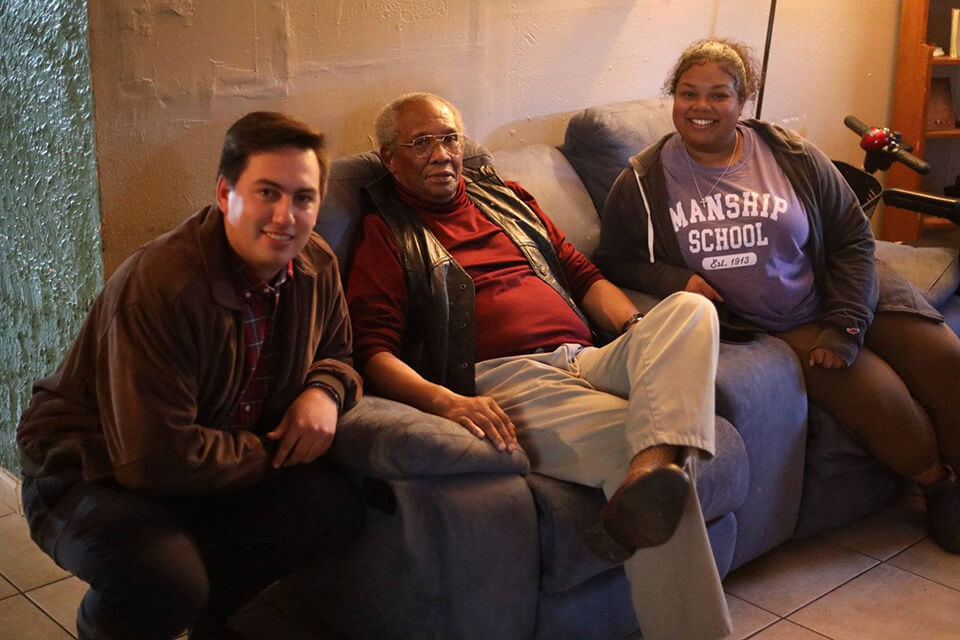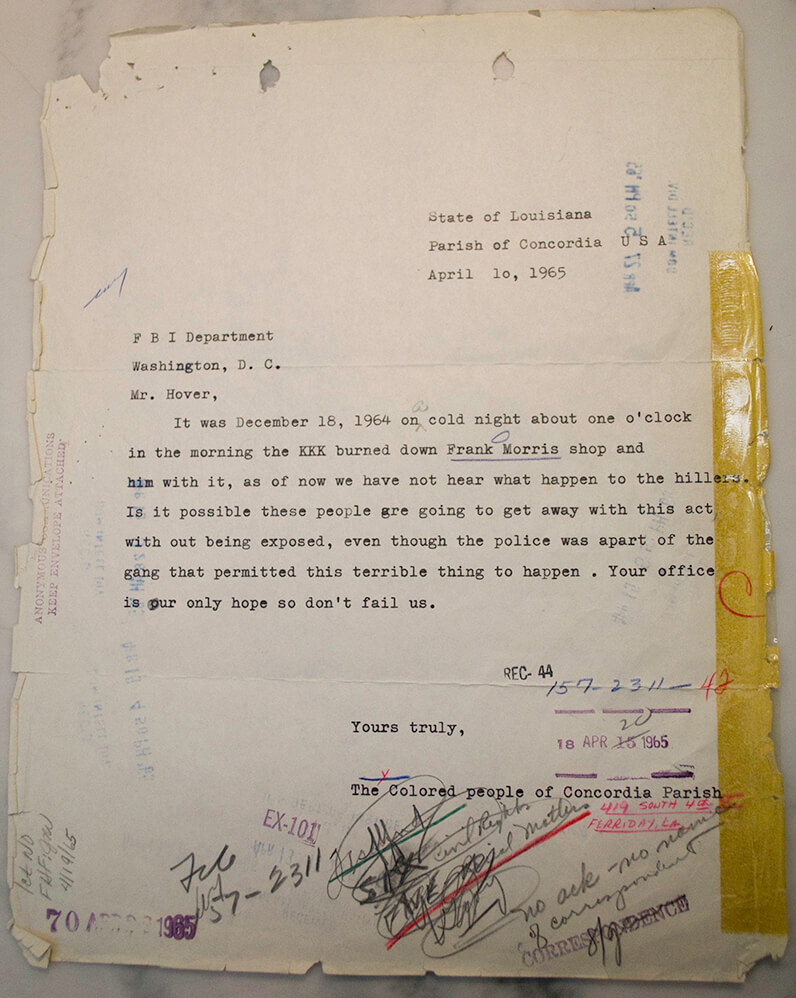Awards
Emmett Till Unsolved Civil Rights Crime Act
In 2007, Congress enacted the Emmett Till Unsolved Civil Rights Crime Act, which directed the U.S. Department of Justice to reopen investigations into more than 100 Civil Rights-related cold case homicides from the 1950s and 1960s. This Act, reprinted below, was the genesis of the LSU Cold Case Project.
One Hundred Tenth Congress of the United States of America
At the Second Session
Begun and held at the City of Washington on Thursday, the third day of January, two thousand and eight
H. R. 923
AN ACT
To provide for the investigation of certain unsolved civil rights crimes, and for other purposes.
Section 1. Short title
This Act may be cited as the Emmett Till Unsolved Civil Rights Crime Act of 2007.
Section 2. Sense of Congress
It is the sense of Congress that all authorities with jurisdiction, including the Federal Bureau of Investigation and other entities within the Department of Justice, should—
(1) expeditiously investigate unsolved civil rights murders, due to the amount of time that has passed since the murders and the age of potential witnesses; and
(2) provide all the resources necessary to ensure timely and thorough investigations in the cases involved.
Section 3. Deputy Chief of the Criminal Section of the Civil Rights Division
(a) In General
The Attorney General shall designate a Deputy Chief in the Criminal Section of the Civil Rights Division of the Department of Justice.
(b) Responsibility
(1)In general
The Deputy Chief shall be responsible for coordinating the investigation and prosecution of violations of criminal civil rights statutes that occurred not later than December 31, 1969, and resulted in a death.
(2) Coordination
In investigating a complaint under paragraph (1), the Deputy Chief may coordinate investigative activities with State and local law enforcement officials.
(c) Study and Report
(1)Study
The Attorney General shall annually conduct a study of the cases under the jurisdiction of the Deputy Chief or under the jurisdiction of the Supervisory Special Agent and, in conducting the study, shall determine—
(A) the number of open investigations within the Department for violations of criminal civil rights statutes that occurred not later than December 31, 1969;
(B) the number of new cases opened pursuant to this Act since the previous year’s study;
(C) the number of unsealed Federal cases charged within the study period, including the case names, the jurisdiction in which the charges were brought, and the date the charges were filed;
(D) the number of cases referred by the Department to a State or local law enforcement agency or prosecutor within the study period, the number of such cases that resulted in State charges being filed, the jurisdiction in which such charges were filed, the date the charges were filed, and if a jurisdiction declines to prosecute or participate in an investigation of a case so referred, the fact it did so;
(E) the number of cases within the study period that were closed without Federal prosecution, the case names of unsealed Federal cases, the dates the cases were closed, and the relevant federal statutes;
(F) the number of attorneys who worked, in whole or in part, on any case described in subsection (b)(1); and
(G) the applications submitted for grants under section 5, the award of such grants, and the purposes for which the grant amount were expended.
(2) Report
Not later than 6 months after the date of enactment of this Act, and each year thereafter, the Attorney General shall prepare and submit to Congress a report containing the results of the study conducted under paragraph (1).
Section 4. Supervisory Special Agent in the Civil Rights Unit of the Federal Bureau of Investigation
(a) In General
The Attorney General shall designate a Supervisory Special Agent in the Civil Rights Unit of the Federal Bureau of Investigation of the Department of Justice.
(b) Responsibility
(1) In general
The Supervisory Special Agent shall be responsible for investigating violations of criminal civil rights statutes that occurred not later than December 31, 1969, and resulted in a death.
(2) Coordination
In investigating a complaint under paragraph (1), the Supervisory Special Agent may coordinate the investigative activities with State and local law enforcement officials.
Section 5. Grants to State and local law enforcement
(a) In general
The Attorney General may award grants to State or local law enforcement agencies for expenses associated with the investigation and prosecution by them of criminal offenses, involving civil rights, that occurred not later than December 31, 1969, and resulted in a death.
(b) Authorization of appropriations
There are authorized to be appropriated $2,000,000 for each of the fiscal years 2008 through 2017 to carry out this section.
Section 6. Authorization of appropriations
(a) In general
There are authorized to be appropriated, in addition to any other amounts otherwise authorized to be appropriated for this purpose, to the Attorney General $10,000,000 for each of the fiscal years 2008 through 2017 for the purpose of investigating and prosecuting violations of criminal civil rights statutes that occurred not later than December 31, 1969, and resulted in a death. These funds shall be allocated by the Attorney General to the Deputy Chief of the Criminal Section of the Civil Rights Division and the Supervisory Special Agent of the Civil Rights Unit of the Federal Bureau of Investigation in order to advance the purposes set forth in this Act.
(b) Community Relations Service of the Department of Justice
In addition to any amounts authorized to be appropriated under title XI of the Civil Rights Act of 1964 (42 U.S.C. 2000h et seq.), there are authorized to be appropriated to the Community Relations Service of the Department of Justice $1,500,000 for fiscal year 2008 and each subsequent fiscal year, to enable the Service (in carrying out the functions described in title X of such Act (42 U.S.C. 2000g et seq.)) to provide technical assistance by bringing together law enforcement agencies and communities in the investigation of violations of criminal civil rights statutes, in cases described in section 4(b).
Section 7. Definition of criminal civil rights statutes
In this Act, the term criminal civil rights statutes means—
(1) section 241 of title 18, United States Code (relating to conspiracy against rights);
(2) section 242 of title 18, United States Code (relating to deprivation of rights under color of law);
(3) section 245 of title 18, United States Code (relating to federally protected activities);
(4) sections 1581 and 1584 of title 18, United States Code (relating to involuntary servitude and peonage);
(5) section 901 of the Fair Housing Act (42 U.S.C. 3631); and
(6) any other Federal law that—
(A) was in effect on or before December 31, 1969; and
(B) the Criminal Section of the Civil Rights Division of the Department of Justice enforced, before the date of enactment of this Act.
Section 8. Sunset
Sections 2 through 6 of this Act shall cease to have effect at the end of fiscal year 2017.
Section 9. Authority of Inspectors General
Title XXXVII of the Crime Control Act of 1990 (42 U.S.C. 5779 et seq.) is amended by adding at the end the following:
Section 3703. Authority of Inspectors General
(a) In general
An Inspector General appointed under section 3 or 8G of the Inspector General Act of 1978 (5 U.S.C. App.) may authorize staff to assist the National Center for Missing and Exploited Children—
(1) by conducting reviews of inactive case files to develop recommendations for further investigations; and
(2) by engaging in similar activities.
(b) Limitations
(1) Priority
An Inspector General may not permit staff to engage in activities described in subsection
(a) if such activities will interfere with the duties of the Inspector General under the Inspector General Act of 1978 (5 U.S.C. App.).
(2) Funding
No additional funds are authorized to be appropriated to carry out this section.


